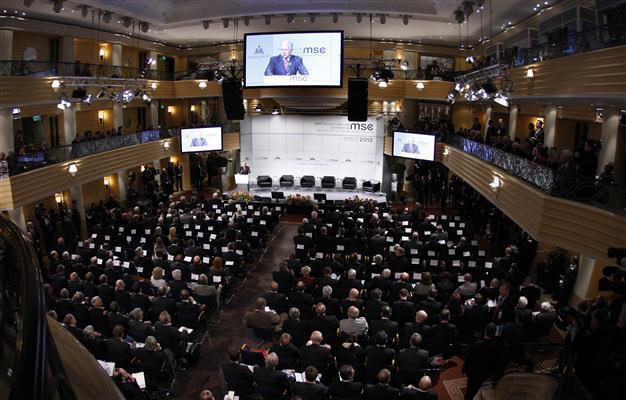No trouble in region: Turkey to Israel, Iran
WASHINGTON / TEHRAN

Wolfgang Ischinger, Chairman of Conference on Security Policy holds his speech during the opening of the 48th Conference on Security Policy in Munich. REUTERS photo
A Turkish diplomatic source said
Turkey does not want any trouble in the region as arguments on military threats against Iran were raised by Israel, the United States and the United Kingdom.
U.S. Defense Secretary Leon Panetta believed there was “strong likelihood” Israel would strike Iran’s nuclear installations this spring, the Washington Post said Jan. 2 in an editorial. When asked about the opinion piece by reporters travelling with him to a NATO meeting in Brussels, Panetta brushed it aside.
“I’m not going to comment on that. David Ignatius can write what he will but with regards with what I think and what I view, I consider that to be an area that belongs to me and nobody else,” he said. “Israel indicated they’re considering this [a strike], we’ve indicated our concerns,” he added.
President Barack Obama and Panetta were “said to have cautioned the Israelis that the U.S. opposes an attack, believing that it would derail an increasingly successful international economic sanctions program and other non-military efforts to stop Iran from crossing the threshold,” he said. “But the White House hasn’t yet decided precisely how the United States would respond if the Israelis do attack.” Iran insisted its nuclear project was peaceful and has threatened retaliation over the fresh sanctions, including possibly disrupting shipping through the strategic Strait of Hormuz.
Britain’s Deputy Prime Minister Nick Clegg told the House Magazine, a weekly British political journal, on Jan. 2 he had concerns there could be a military
conflict with Iran over its disputed nuclear program, refusing to say whether Britain would “participate” in such a clash. “Of course I worry that there will be a military conflict and that certain countries might seek to take matters into their own hands,” Clegg was quoted as saying.
As a close neighbor Turkey was uncomfortable with the recent developments. Regarding mounting military threats against Iran over its controversial nuclear program, a Turkish diplomatic source told Hürriyet Daily News, “We don’t want any trouble in the region. We tell this on every occasion. We are against any military action wherever it comes from,” the source said.
The source said Turkey is also calling on Iran to solve the problem through negotiations. “It is not necessarily to be held in Istanbul. If they want they are welcomed. The only thing we want is a solution through dialogue.” Recently, Iranian Foreign Minister Ali Akhbar Salehi said Istanbul would be the likely venue of the next round of nuclear talks between Iran and the P5+1 group.
Israelis seem serious on idea of military action. During a strategy conference in Herzliya on Jan. 2, Israeli officials asserted Iran has already produced enough enriched uranium to eventually build four rudimentary nuclear bombs and – in what would be an explosive new twist – was even developing missiles capable of reaching the United States.
Defense Minister Ehud Barak has said the world was increasingly ready to consider a military strike against Iran if economic sanctions do not halt Tehran’s suspect nuclear program. “Today, as opposed to in the past, there is wide world understanding that in the event that sanctions won’t reach the intended result of stopping the military nuclear program, there will be need to consider action,” he said.
Response from IranAs a response to rising threat, Iran will help any nation or group that confronts the “cancer” Israel, the Islamic Republic’s Supreme Leader Ayatollah Ali Khamenei said Feb. 3. He also said in remarks delivered to worshippers at prayers in Tehran and broadcast on state TV the country would continue its controversial nuclear program and warned that any military strike by the U.S. would only make Iran stronger.
Khamenei also warned Tehran would reveal a letter which it says U.S. President Barack Obama sent to the Iranian leadership in an attempt to end the nuclear stand-off. He said it shows the Americans cannot be trusted. The White House has denied that such a letter existed.
Khamenei affirmed Iran had assisted militant groups like the Lebanese Hezbollah and the Palestinian Hamas – a well-known policy, but one that Iranian leaders rarely state explicitly. “We have intervened in anti-Israel matters, and it brought victory in the 33-Day War by Hezbollah against Israel in 2006, and in the 22-Day War” between Hamas and Israel in the Gaza Strip, he said.
Israel’s large-scale military incursion against Hamas in 2008 and 2009 in Gaza ended in a cease-fire, with Israel claiming to have inflicted heavy damage on the militant organization. The war in Lebanon ended with a U.N.-brokered truce that sent thousands of Lebanese troops and international peacekeepers into southern Lebanon to prevent another outbreak.
“From now on, in any place, if any nation or any group confronts the Zionist regime, we will endorse and we will help. We have no fear expressing this,” said Khamenei.
Middle East, tension,
